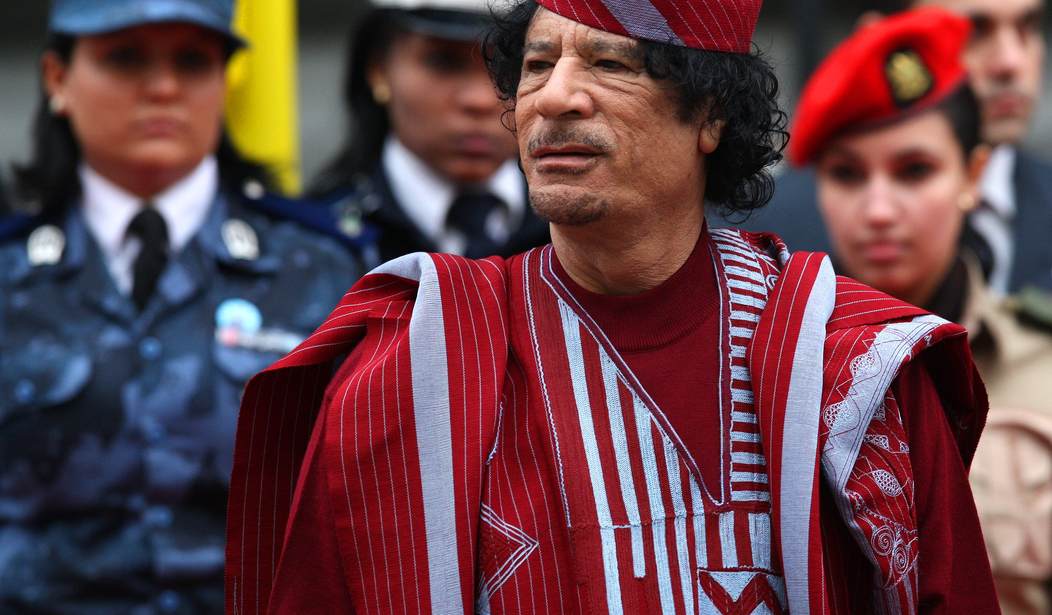Former Rep. Pete Hoekstra (R-Mich.) said late Libyan dictator Moammar Gadhafi was cooperating with the U.S. government before the Obama administration decided to intervene militarily in Libya in 2011.
Hoekstra, the former chairman of the House Intelligence Committee, said Libya remains “ungoverned” today and has become a “cesspool” of jihadists.
“The only time we thought about taking [Gadhafi] out was after 2003 when he was an ally that actually started to level the scale a little bit. And so in total, people can reach different conclusions as to whether he was a good guy or bad guy but the bottom line is when we decided to take him out he was doing everything we had asked him to do and had been doing it for eight or nine years,” Hoekstra said at the Center for Security Policy’s Middle East and North Africa Briefing.
Hoekstra, a Shillman senior fellow at the Investigative Project on Terrorism, said Gadhafi was working with the U.S. military and U.S. intelligence networks to provide insight into the “radical jihadist movement” before the U.S.-led intervention. Hoekstra said Gadhafi’s cooperation was helpful to the U.S. because he had been fighting extremists for decades.
“He’s the one that could provide us the insight, helped us find some of them, helped us interrogate some of them and helped give us some insights into who these folks were, so that is the Gadhafi that we saw evolve and I saw evolve from 2003 and 2009,” Hoekstra said.
He said the Obama administration has a “laudable goal” of establishing a strong relationship with Libya to help its people move forward, but the country remains ungoverned.
“There is not a government. It is kind of like Iraq and Syria. It is an ungoverned region. There is no central government. There are factions. There are tribes. There are different coalitions and there is no government for us to build a new Libya with. All we have in Libya is a ungoverned zone that is exporting radical ideology,” Hoekstra said.
“It is exporting fighters and it is exporting weapons into northern Africa and into the Middle East. It is a cesspool of radical jihadists and that is the result of not confronting, not containing and not putting in place the ultimate strategy of confronting, containing and defeating radical jihadists,” he added.
Hoekstra argued that the U.S. has lost Libya and northern Africa, which has fueled the crisis in Syria and Iraq.
“We’ve dug a hole deeper rather than making progress,” he said.
Hoekstra criticized President Obama for believing the “power of his personality” would bring peace to the Middle East.
“This president, as he did in Egypt, as he’s done in Iran, as he’s done in Syria, has decided that in America’s best interest he believes he can manage, work with, but most importantly he believed that because of the power of his personality the radical jihadist movement would fundamentally change their view of America and change their behavior,” he said.
Hoekstra cited a quote from Obama in November 2007 during his first run for president.
“I truly believe that the day I’m inaugurated, not only the country looks at itself differently, but the world looks at America differently,” Obama said at the time. “If I’m reaching out to the Muslim world they understand that I’ve lived in a Muslim country and I may be a Christian, but I also understand their point of view.”
According to Hoekstra, that statement demonstrates Obama thought every country in the Middle East would change their worldview and “national self-interest” after he entered the White House, which he argued has not happened.
Overall, Hoekstra said, the U.S. is worse off strategically than it was on Sept. 11, 2001.
“The threat to us and to our allies, to Western Europe, today is greater than what it was then,” he said.









Join the conversation as a VIP Member